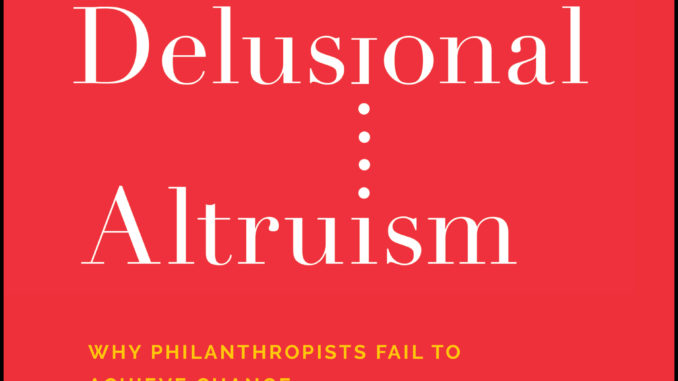
Kris Putnam-Walkerly’s accomplishments are certainly impressive. She is an advisor to innumerable Fortune 500 companies, wealthy families, and celebrity activists, among others, regarding their philanthropic endeavors. She is an in-demand public speaker on the subject, frequently rated among the best twenty five working in the United States today on the subject of philanthropy, and has aided over one hundred philanthropists smartly allocate over a half a billion dollars in grants and gifts. She brings the full force of these accomplishments and what she has learned from them to bear on her latest book Delusional Altruism: Why Philanthropists Fail to Achieve Change and What They Can Do to Transform Giving and, by doing so, has written an invaluable guide for those looking to focus their philanthropic desires appropriately.
MORE ON PUTNUM CONSULTING: putnam-consulting.com/
I see evidence of her experience as a writer in each chapter of this book. Having never heard her speak in public, I nevertheless believe it is a safe bet to assume the book is a lengthier extension of the lectures she delivers as a public speaker as the overall tone of the book has the air of someone addressing an audience. She keeps her language reined in, never going over the reader’s heads, and her focus on the subject at hand in each chapter disavows any sort of digressions. She assumes a teacher-like tone at times that some readers may dislike, but a genuine desire to share her knowledge and experiences with those engaging the text motivates such moments.
The book relies on her authorial voice throughout – there are no illustrations or graphics supplementing the book. She does offer up a few exercises for readers to take part in throughout the course of Delusional Altruism but these are instructional rather than ornamental. She does quite often, however, from other sources to support her ideas and the rich research she lavishes on the book pays off by further reinforcing her point of view. Her documentation of those secondary sources is meticulous.
The tone she takes on for the book is likewise notable. She isn’t scolding of individual’s philanthropic mistakes during the book’s first part but, instead, shows a keen understanding of human nature that ranks as one of this book’s chief strengths. Perhaps she is too idealistic in assuming that the underlying reason behind philanthropic endeavors is a desire to change the world for the better as the nation’s tax laws look rather favorably on charitable giving, but it’s the only recognizable chink in her otherwise sturdy understanding of what drives many people to give.
AMAZON: www.amazon.com/Delusional-Altruism-Philanthropists-Achieve-Transform/dp/1119606063
This easily digestible reading experience doesn’t veer off course or waste readers’ time with irrelevant sideshows. Moreover, it’s a book you can return to multiple times to glean further understanding of the potential pitfalls and victories possible for any philanthropic effort. It is my recommendation that your initial reading of the book go from beginning to end, but you can cherry pick subsequent consultations with the text for concerns and situations relevant to your own. Kris Putnam-Walkerly’s Delusional Altruism: Why Philanthropists Fail to Achieve Change and What They Can Do to Transform Giving is an impressive piece of work.
Clay Burton
